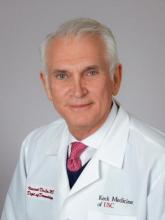Dermatology Weekly
Dermatology Weekly combines the latest news in clinical dermatology with peer-to-peer interviews with Vincent A. DeLeo, MD.
For older Cutis audiocasts, click here.
How to Listen
Podcast Participants
Vincent A. DeLeo, MD, is from the Keck School of Medicine of the University of Southern California, Los Angeles, and the Icahn School of Medicine at Mount Sinai, New York, New York. He also is the editor in chief of Cutis and the author of more than 200 publications. He is a leading expert on contact dermatitis, sunscreens, and photosensitivity. Dr. DeLeo is a consultant for Estée Lauder.

